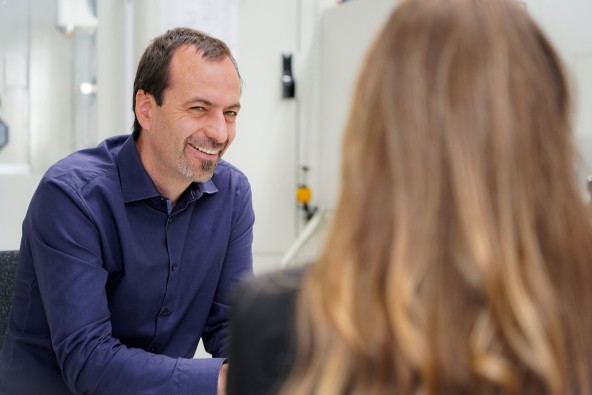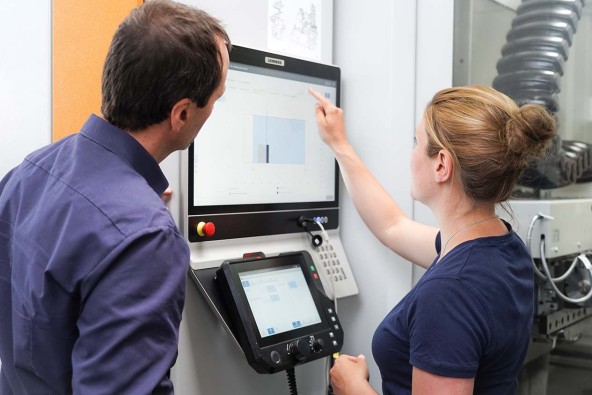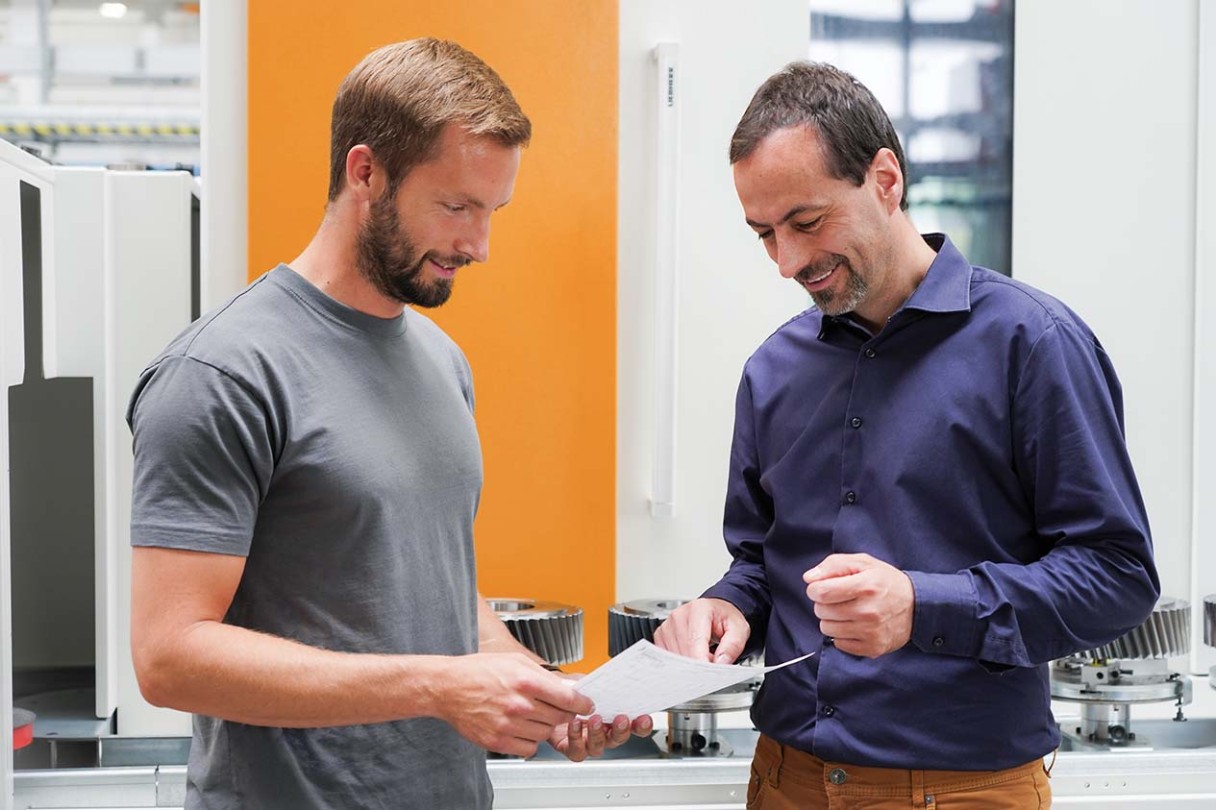A conversation with Bernd Rösch, Head of Testing for Gear Technology: planning the unplannable
Bernd Rösch has been head of the testing department at Liebherr-Verzahntechnik GmbH since 2017. His time at Liebherr began back in the late 90s with an apprenticeship as a precision mechanic. After completing a degree, he returned as an engineer and, working as a tester, helped build up the department. Starting with four employees, the department has grown steadily. Now, as head of the department, he and his 20-strong team help customers on their journey to finding the perfect process and the right machine.
But what exactly does this journey look like? What is a customer test like and what challenges are there in this area? We asked him more about this.

You’re in charge of testing at Liebherr-Verzahntechnik GmbH. What does your department do and what are your tasks like?
As the name suggests, we carry out tests. We test and improve prototypes of our gear cutting machines, their assemblies and the associated software for our own product development or technology trials. We recreate errors and feedback from the field to find solutions. Above all, we test and develop processes and technologies for workpieces from customers in any industry: automotive, wind power, e-mobility, contract manufacturers, aerospace and also our own gear cutting tools from the plant in Ettlingen. The processes in customer testing, technology testing and product testing are very similar. All our staff work in all three areas. This means they can follow a product from development onwards and later test the production of gears for our customers on the same machine.
My job here is to make sure that everything is available for the team to do its work. That starts, of course, with machine procurement. We also have internal delivery times to take into account. This means that I sometimes have to know now what we’ll be testing in a year’s time. It’s all about planning. Machines, tools, workpieces and personnel have to be organized, and the machinery must always be at the cutting edge of technology. I set priorities and also act as a link, not just between product technology and customer testing, but also with other departments such as sales, service and product development.
We provide live demonstrations of what we can do and prove that we are the right partner.
Let’s say a customer wants to produce a workpiece and find the perfect process for it. How do you go about it?
The customer comes to us with a workpiece drawing and wants to see it manufactured on one of our machines. First, the basics need to be clarified. Which machine should the gear be produced on, which technology should be used, which tool can be used, with or without automation, and so on. I often feel like a kid in a candy store. There are so many ways and possibilities to make a gear and we have to find the best one.
The preparation for the test must be completed as soon as possible so that we can present the first solution proposals and use the results in subsequent work. Throughout the entire test process, the customer has one contact person who is responsible for everything – from the offer to the final test report. When the preparation is ready, the customer comes to us to carry out the test and can take a look at our machines and technological expertise on site.
We see ourselves as a kind of advertising department for sales – we provide live demonstrations of what we can do and prove that we are the right partner.
And what makes Liebherr the right partner?
For us, the focus is on the customers and their gears. We have the know-how and the technology. But above all, we’re flexible. If we don’t yet have the perfect solution for the workpiece or the customer's requirements, we’ll look at it together, put our cards on the table and show what we already offer and what we can develop. Honest communication and working together on developing a solution creates a strong bond with the customer.
It’s so important to communicate on equal terms. Our employees are all experts in their respective technologies and know exactly what they are talking about. Most of them have been with us since they were trainees and know all about gear technology. We also use the product for our own tests in the same way as the customer does later in production – this way we keep an overview of the whole process and can react effectively when it comes to troubleshooting.
Then there’s our machinery. We’ve got every technology and every size. So if a customer wants to buy an LGG 500, for example, no problem, we have one and can present it to them.
A unique machine
A visit to the HMC Gears plant in Indiana kicked off an extensive project which resulted in the creation of a unique solution for exceptional demands: With the LC 4000, Liebherr forges new paths in large-scale gear cutting production and unites diverse machining methods in one highly efficient machine for the American gear specialist.
What has been the highlight of your time in testing at Liebherr?
The LC 4000 gear hobbing machine for large gears for HMC Gears. That was a case where we didn’t yet have the right machine concept, but we knew we could develop it. The customer wanted to produce spur gears as well as double helical and herringbone gears with diameters of 2.5 – 4 meters on a single machine. In the end, we combined several cutting technologies, including 4-axis milling with universal shank hobs, in one machine.
We tested the individual assemblies and software. We set up the machine completely at our site and the customer came to Kempten for preliminary acceptance. Then we shipped the machine over to the States to set it up again for final acceptance. It was a big and challenging project, but to see something of that size on site at the end after all the hurdles and hard work – it makes you proud and is a lot of fun.

What’s the biggest challenge in your job?
As I said, it’s all about planning in my department. And that’s exactly what the challenge is: planning the unplannable. No matter how well structured everything is set up and planned, we encounter unexpected and sudden changes almost every day, such as delivery delays for tools and equipment, missing test workpieces or an urgent service case.
Coordinating all our machines, various assemblies and their variants with our employees isn’t easy. And when you think you’ve done your job for the day, sometimes all your plans are suddenly upset. Then you need to think and act quickly. It can be nerve-wracking, but that thrill is also just what I need.
I have to say that ultimately it all only works because we’re such a well-practiced team and can also rely on the other departments. Everyone pulls together.
What makes working at Liebherr special for you?
You can feel that it’s a family business. I like the consistency and the informal environment. You know and regularly meet the decision-makers of the Liebherr Group and can talk to them as equals.
We let our products and our technological expertise do the talking, instead of boasting and talking down our competitors. Gear making is a complex business, and you never stop learning. But Liebherr gives you the space and trusts you to continuously tackle that learning process together with your customers.

